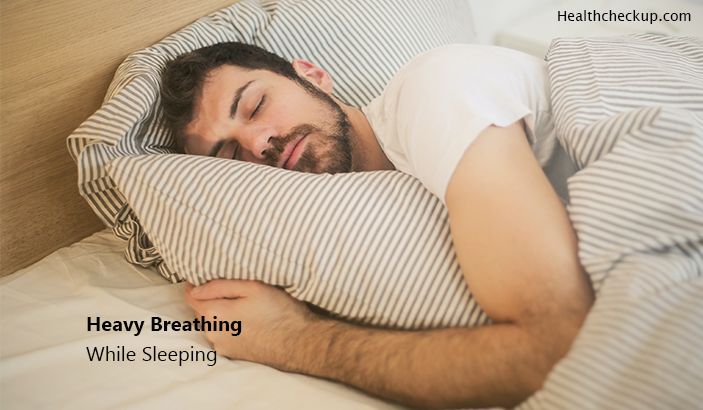Breathing problems can lead to many unhealthy conditions amongst which heavy breathing while sleeping is one. There could be many reasons for snoring and heavy breathing while sleeping including obstructive sleep apnea. Knowing the correct cause is very much important to treat the condition. Although it isn’t a serious issue having a detailed view can help you out from the situation.
What Is Heavy Breathing?
In simple terms, heavy breathing is nothing but shortness of breath. In medical terms shortness of breath is known as dyspnea which again is a sign of many underlying health issues. The issues could be heart problems, lung infections, anxiety, or allergies.
Noticing heavy breathing while the body is in action such as exercising or any other physical activity is normal but when the same situation is present even while the body is still or at rest is a sign of heavy breathing.
In this condition, the body has to work more to receive sufficient oxygen. Heavy breathing indicates that less air is passing through the mouth and nose or less oxygen is getting into the bloodstream making it difficult for the body to breathe. Heavy breathing is an indication that the body has to work hard to receive adequate oxygen.
What Causes Heavy Breathing While Sleeping?
All the conditions that are in play for heavy breathing during the morning also cause the condition at night. Anything from a stuffy nose to chronic obstructive pulmonary disease (COPD) can lead to this.
As a condition, heavy breathing isn’t a major health hurdle but is signaling some other underlying health condition or indicating some other future health problem that may soon set in.
As said above the most common cause of this condition is obstructive sleep apnea. In this state, the throat muscles relax and block the opening to the airways. This obstruction frequently obstructs breathing all through the night.
Some Other Causes Include
- Nasal congestion from respiratory infection or cold
- COPD
- Obesity
- Heart failure
- Asthma
- Pulmonary embolism
- Pneumonia
- Anxiety and panic attacks
- Allergies
Heavy breathing while sleeping in adults
Once a person crosses the age of 40 the chances of breathing problems increases. Whatever the reason behind this, breathing problems augment if left unattended. Obesity, large neck, a family history of sleep apnea all these severe the condition in adults. The best means to fight the condition is to know the underlying cause and take treatment accordingly.
Heavy Breathing In Babies While Sleeping
Toddler heavy breathing while sleeping is also as common as heavy breathing in adults while sleeping.
Newborns less than 6 months old usually breathe 40 times per minute, anything more than this or less than this may indicate some underlying problem.
In general, fast breathing or heavy breathing is itself not a problem, however, here are few things to take note of.
- Deep coughing, which could be a symptom of infection or mucus in the lungs
- Snoring or whistling noise, which could require taking off mucus from the nose
- A snarling and hoarse cry that may signal croup
- Heavy, fast breathing which may supposedly be mucus in the airways from transient tachypnea or pneumonia
- Wheezing due to bronchiolitis or asthma
- Constant dry cough that could be the result of an allergy
Keep a watch on how your baby breathes and work out with your pediatrician if you notice any deviance in the breathing of the child.
How To Stop Heavy Breathing While Sleeping?
Before actually hitting a clinic there are some home remedies and exercises you can try first.
- Sleep in a relaxed position
- Diaphragmatic breathing is another way to treat this
- Drink coffee in moderation caffeine is known to relax muscles
- Quit smoking and avoid exposure to allergens
- Stay in a cool atmosphere
- Follow pursed-lip breathing
How To Diagnose Heavy Breathing While Sleeping?
A doctor will perform a physical exam and in most cases, the initial exam will let the doctor know the condition. Based on further need a person may be asked for the below tests;
- Pulse oximetry
- Electrocardiography
- Chest radiography
- Stress testing
- Spirometry
- Sleep study
Treatment For Heavy Breathing While Sleeping
Treatment depends on the cause and each cause needs different treatment based on the severity and period of existence. All the causes can’t be treated with one simple method. Depending on the cause and the diagnosis reports a health care provider will suggest treatment that may include invasive or non-invasive methods. In rare cases, surgery may also be recommended.
Heavy breathing while sleeping in pregnant women is also seen due to internal changes especially due to the enlargement of the uterus. The reasons for heavy breathing while sleeping differ from person to person, before visiting a doctor try to figure out the condition so that your doctor can understand your situation clearly.

Sudheendra is a passionate blogger for 8 years and holds a Degree in Journalism & Mass Communications. His writings particularly focus on health, medicine, diet & lifestyle. For him, everything that interlinks and relates to health & medical world entices him. His write-ups aim at educating people not by just giving facts but by infusing human touch.









